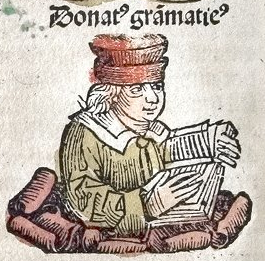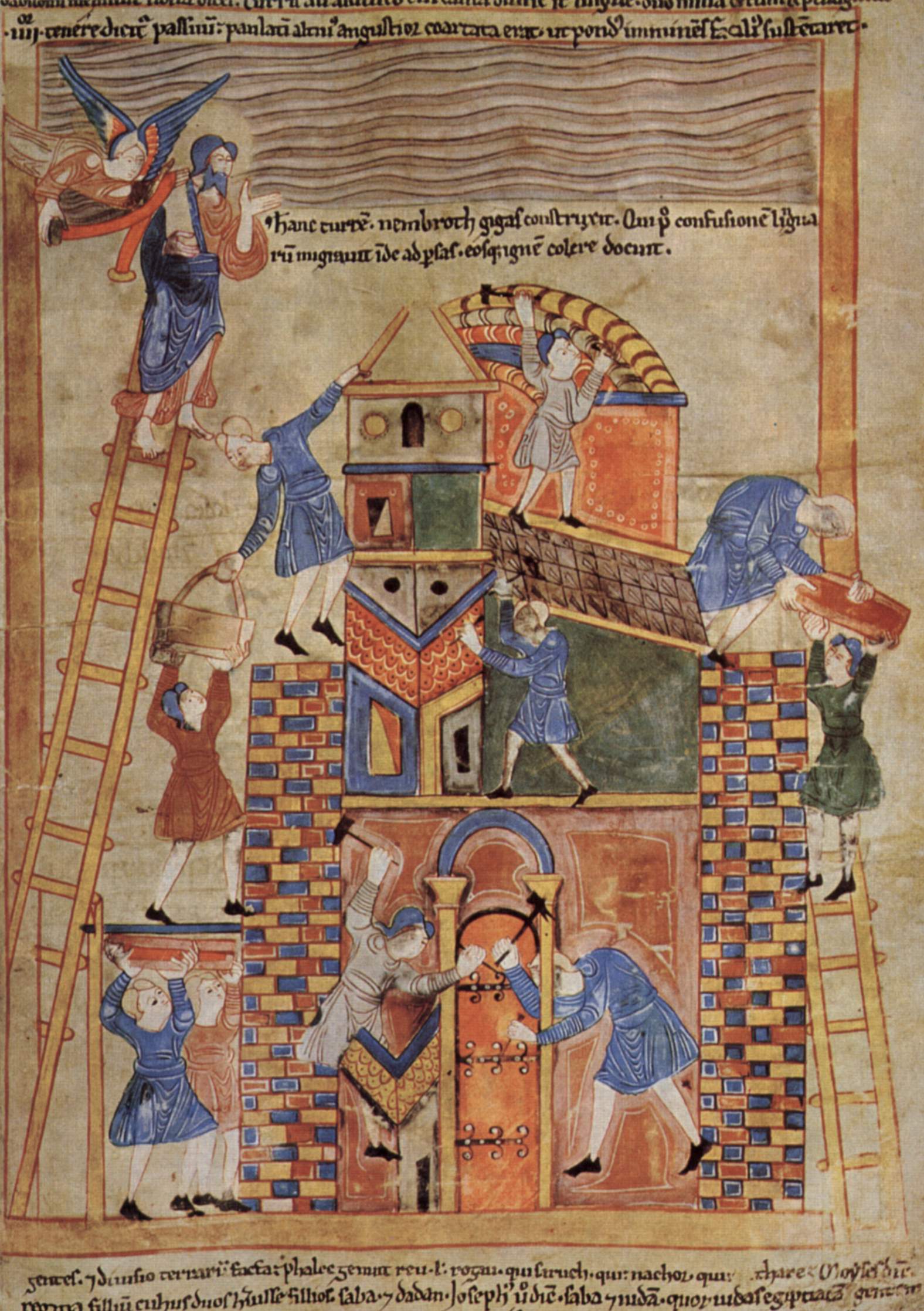|
Excerptiones De Prisciano
The ''Excerptiones Prisciani'' (also known as ''Excerptiones de Prisciano'') is a tenth-century compilation of Priscian's ''Institutiones grammaticae'' and Donatus's ''Ars maior''. History It is found in three manuscripts: Antwerp, Plantin-Moretus Museum, MS 16.2 (where it is accompanied by the Antwerp-London Glossaries); Paris, Bibliothèque Nationale, nouv. acq. lat. 586; and Chartres, Bibliothèque municipale, 56. It is thought to have been compiled by (or under the supervision of) the early medieval English monk and scholar Ælfric of Eynsham, and was the basis for the Latin grammar that he wrote in Old English. In compiling his text, Ælfric was working in a Carolingian The Carolingian dynasty ( ; known variously as the Carlovingians, Carolingus, Carolings, Karolinger or Karlings) was a Frankish noble family named after Charles Martel and his grandson Charlemagne, descendants of the Arnulfing and Pippinid c ... scholarly tradition of adapting Classical works on gramm ... [...More Info...] [...Related Items...] OR: [Wikipedia] [Google] [Baidu] |
Priscian
Priscianus Caesariensis (), commonly known as Priscian ( or ), was a Latin grammarian and the author of the ''Institutes of Grammar'', which was the standard textbook for the study of Latin during the Middle Ages. It also provided the raw material for the field of speculative grammar. Life The details of Priscian's life are largely unknown. Priscian was born and raised in the North-African city of Caesarea (modern Cherchell, Algeria), the capital of the Roman province of Mauretania Caesariensis, which during his lifetime would be under the control of the Vandalic Kingdom. He was probably of Greek descent. According to Cassiodorus, he taught Latin at Constantinople in the early sixth century. His minor works include a panegyric to Anastasius (491—518), written about 512, which helps establish his time period. In addition, the manuscripts of his ''Institutes'' contain a subscription to the effect that the work was copied (526, 527) by Flavius Theodorus, a clerk in the im ... [...More Info...] [...Related Items...] OR: [Wikipedia] [Google] [Baidu] |
Aelius Donatus
Aelius Donatus (; fl. mid-fourth century AD) was a Roman grammarian and teacher of rhetoric. He once taught Jerome, an early Christian Church father who is most known for his translation of the Bible into Latin, known as the Latin Vulgate. Newer revisions of the Vulgate are still in common use by the Catholic Church. Works He was the author of a number of professional works, of which several are extant: *Ars maior – A commentary on Latin grammar. * Ars minor – A commentary on parts of Latin Speech. * Commentvm Terenti, Publii Terentii Comoediae Sex with preface de tragoedia et comoedia (Commentary on Terence, Six Comedies of Terence with the preface About Tragedies and Comedies) – A commentary on the playwright Terence and all six of his plays, probably compiled from other commentaries. The preface is a commentary on the "proper" structures of Tragedies and Comedies by Donatus titled, "About Comedies and Tragedies." It has never been translated to English as parts are ... [...More Info...] [...Related Items...] OR: [Wikipedia] [Google] [Baidu] |
Antwerp-London Glossaries
The Antwerp-London Glossaries are a set of eleventh-century glossaries found in the margins of what was once a single manuscript of the '' Excerptiones Prisciani''. They provide important evidence for Old English vocabulary, and in David W. Porter's estimation, the glossaries offer "a vivid picture of Anglo-Saxon school texts and the environment that produced them".David W. Porter,On the Antwerp-London Glossaries, ''Journal of English and Germanic Philology'', 98 (1999), 170–92. Manuscript(s) Now split in two, the manuscript is held as Antwerp, Plantin-Moretus Museum, 16.2 and London, British Library, Add. 32246. The cities in which this dismembered manuscript is held give their name to the glossaries. The glossaries are thought to have been produced at Abingdon Abbey by a group of scholars who also produced the exceptionally densely glossed copy of Aldhelm's ''Prosa de virginitate'' in the manuscript Brussels, Bibliothèque Royale 1650 (which might also once have been part of t ... [...More Info...] [...Related Items...] OR: [Wikipedia] [Google] [Baidu] |
Bibliothèque Nationale
A library is a collection of books, and possibly other materials and media, that is accessible for use by its members and members of allied institutions. Libraries provide physical (hard copies) or digital (soft copies) materials, and may be a physical location, a virtual space, or both. A library's collection normally includes printed materials which may be borrowed, and usually also includes a reference section of publications which may only be utilized inside the premises. Resources such as commercial releases of films, television programmes, other video recordings, radio, music and audio recordings may be available in many formats. These include DVDs, Blu-rays, CDs, cassettes, or other applicable formats such as microform. They may also provide access to information, music or other content held on bibliographic databases. In addition, some libraries offer creation stations for makers which offer access to a 3D printing station with a 3D scanner. Libraries can vary widel ... [...More Info...] [...Related Items...] OR: [Wikipedia] [Google] [Baidu] |
Ælfric Of Eynsham
Ælfric of Eynsham (; ; ) was an English abbot and a student of Æthelwold of Winchester, and a consummate, prolific writer in Old English of hagiography, homilies, biblical commentaries, and other genres. He is also known variously as ''Ælfric the Grammarian'' (''Alfricus Grammaticus''), ''Ælfric of Cerne'', and ''Ælfric the Homilist''. In the view of Peter Hunter Blair, he was "a man comparable both in the quantity of his writings and in the quality of his mind even with Bede himself." According to Claudio Leonardi, he "represented the highest pinnacle of Benedictine reform and Anglo-Saxon literature". Life and works Ælfric was educated in the Benedictine Old Minster at Winchester under Saint Æthelwold, who was bishop there from 963 to 984. Æthelwold had carried on the tradition of Dunstan in his government of the abbey of Abingdon, then in Berkshire, and at Winchester he continued his strenuous support for the English Benedictine Reform. He seems to ha ... [...More Info...] [...Related Items...] OR: [Wikipedia] [Google] [Baidu] |
Old English
Old English ( or , or ), or Anglo-Saxon, is the earliest recorded form of the English language, spoken in England and southern and eastern Scotland in the Early Middle Ages. It developed from the languages brought to Great Britain by Anglo-Saxon settlers in the mid-5th century, and the first Old English literature dates from the mid-7th century. After the Norman Conquest of 1066, English was replaced for several centuries by Anglo-Norman language, Anglo-Norman (a langues d'oïl, type of French) as the language of the upper classes. This is regarded as marking the end of the Old English era, since during the subsequent period the English language was heavily influenced by Anglo-Norman, developing into what is now known as Middle English in England and Early Scots in Scotland. Old English developed from a set of Anglo-Frisian or Ingvaeonic dialects originally spoken by Germanic tribes traditionally known as the Angles (tribe), Angles, Saxons and Jutes. As the Germanic settlers ... [...More Info...] [...Related Items...] OR: [Wikipedia] [Google] [Baidu] |
Carolingians
The Carolingian dynasty ( ; known variously as the Carlovingians, Carolingus, Carolings, Karolinger or Karlings) was a Frankish noble family named after Charles Martel and his grandson Charlemagne, descendants of the Arnulfing and Pippinid clans of the 7th century AD. The dynasty consolidated its power in the 8th century, eventually making the offices of mayor of the palace and '' dux et princeps Francorum'' hereditary, and becoming the ''de facto'' rulers of the Franks as the real powers behind the Merovingian throne. In 751 the Merovingian dynasty which had ruled the Franks was overthrown with the consent of the Papacy and the aristocracy, and Pepin the Short, son of Martel, was crowned King of the Franks. The Carolingian dynasty reached its peak in 800 with the crowning of Charlemagne as the first Emperor of the Romans in the West in over three centuries. Nearly every monarch of France from Charlemagne's son Louis the Pious until the penultimate monarch of France Lou ... [...More Info...] [...Related Items...] OR: [Wikipedia] [Google] [Baidu] |



